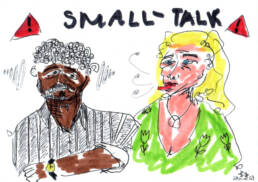Since we wrote about our precious time in the last blog, it’s worth asking: how much small talk do we use in our everyday lives, and is it really worth it to have these short, superficial dialogues then? And: What goals are we pursuing with this?
First of all, to keep it short: Yes, it’s worth it.
The question of how much – that’s what we’re trying to examine together today in a special way.
We at DNA VISUALS advertise with the slogan: Finding solutions, leaving strategies. Not without reason, almost every company has a slogan. Often, you don’t have all the time in the world to explain your company and the ideas and values associated with it on the fly. A short, effectively formulated, catchy slogan helps the company build its brand and stay in the memory of (potential) customers – and is at least as important as a logo!
A slogan would be a great candidate if we are literally talking about small talk, in the sense of “little speech”. A slogan is also a short, snappy phrase to get you talking. However, a slogan serves the company in a very different way than the words you exchange with customers on the phone or at a meeting at the beginning of a conversation.
“Nice to meet you, how was the drive here?” “Good! There was a little traffic jam, but at least the weather was nice.” “Yes, it’s warm today – you can’t complain.” “If only every day was like today, right?” “I don’t really know, I like the cool days too. A change now and then enriches life.”
Of course, you did not have a sophisticated dialogue, however, just both parties, at eye level, hope to enter into a good conversation and start with a simple exchange.
Well – so that this post has an added value for you as well and we don’t just talk about the little things, I will try to be a good example and explain our ideas and services in a short post – which, besides this introduction – will function without any small talk at all.
“Finding solutions, leaving strategies”. The solution must be discussed jointly and individually from a marketing point of view – but – what is a strategy?
A strategy is a set of decisions integrated in (business) life, with which you position yourself in the market to win. They are choices and these choices are important because they define exactly what you are and how you appear to customers and the competition. Strategies are clearly different from plans. Plans seem like a list of activities and actions you want to perform, but most of the time they don’t come close to a strategy because they don’t explicitly explain when you will perform them, where they will position you, and how you will win with them.
For example, a plan would be: This is the list of goals we want to achieve.
And a strategy: With these sets of decisions we pursue the goals to win and be better than the competition.
The sad thing about most plans (while good at their core) is that the individual bundles of winning decisions are not integrated. Two fundamental questions that must be part of a strategy and integrated into every bundle: Where do we play and how do we win?
In other words, where do we position ourselves in the market and how do we ensure that we are the best (or among the better)?
If you don’t make these decisions up front, you’re selling yourself cheap. If you don’t even try to win, others will gladly take over. And once your competition figures out how to win, you lead a miserable life. In fact, many companies play simply to play and others have grown beyond that and play to win. That’s where successful companies differ from institutions that always barely survive.
Today, proactively make the following decision: Do I want to be a winner or simply a participant?
Since you want to be a winner, ask yourself the question: Who am I playing against and where are my opponent’s weaknesses?
To build a good strategy, of course, you need much more. A good strategy defines precisely where in the market I make which decision to win the customers that others have not yet won and where in the market I persuade customers to switch sides and come to me. The goal is to score points consistently and, in a second step, to take over points from the opponent – in other words, to push the competition away.
The worst case scenario is when each party does the same thing in the same way. When everyone promises the same thing, just wearing different masks. Similar to the insurance, finance and, for example, airline industries. There, good market positioning is of considerable importance if you want to win.
For this reason, every strategy needs a pinch of creativity & gut feeling.
Where are there gaps? How do I create a future that does not exist today. What decisions do I make to open gaps and score goals? In the high league we play in today, it’s all a question of positioning ourselves correctly.
You as a business leader need to make “where to play, how to win” decisions and your team needs to execute strategically and ensure that demand is best supplied and more and more demand is generated organically.
Shortened again: Make strategic decisions that bring profit, market them with your marketing team in the right place, analyze the success in sales, continue to work on the strategy and make the right decisions from scratch to become better.
What is the “right” decision in a nutshell: The right decision builds trust in your brand. Much like building trust at the beginning of a conversation with small talk, build trust with your clientele at the beginning with the right marketing decisions. And: Small talk should not be too long. Soon the customer needs to be reminded: We keep our promise and deliver better than the competition. Constantly! Because mistakes are less likely to be forgiven. Customers are less likely to stay loyal if trust is broken – because everyone has to cut corners these days and the competition is constantly trying to push you away.
Finally, you should make the right promises with marketing and show as accurately as possible why you are trustworthy and others less so. Then, of course, it’s a matter of delivering and getting better all the time. Keeping promises. This is how you build your brand and keep building it.
Building and continuing to build trust is also key to a good advertising campaign. Anything else would be a waste of money (just like small talk with people you don’t trust anyway). These only rip off your valuable time.
We hope that with this brief introduction to strategy we have gained your trust, that you have not wasted your time here, and that we can create a future that is better. Together.
(Sources & inspiration: Roger Martin, Wikipedia)

Related Posts
March 9, 2023
Values or taboos? Ikigai or Shinigai?
At the turn of the 19th century, Kant asked, “Why is work the best way to…
September 30, 2022
Elixir of success
To create an iconic product, you need a person with a brilliant idea and the…



